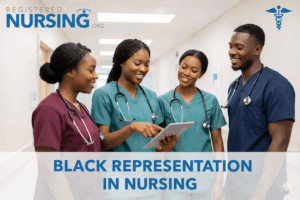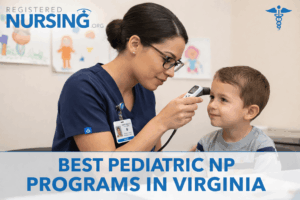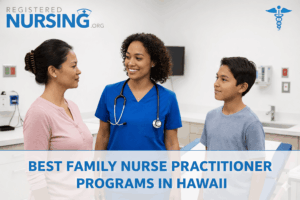Advanced Practice Registered Nurse (APRN)

Many nurses eventually wish to enter more advanced practice roles. We break down everything you need to know about how to become an RN, what these roles entail, and what specializations you can choose.
What Is an APRN?
Simply put, an APRN is an Advanced Practice Registered Nurse. This means that this type of RN has earned a graduate-level degree such as a Master's of Science in Nursing (MSN) or a Doctor of Nursing Practice (DNP), and has been specially trained in one of the four recognized APRN roles. Many RNs who hold an ADN or BSN and wish to progress in their careers choose to become APRNs so that they can dive into a more focused nursing practice with a higher degree of autonomy.
According to the APRN Consensus Model, there are four roles an APRN can hold: certified nurse-midwife (CNM), certified registered nurse anesthetist (CRNA), clinical nurse specialist (CNS), and nurse practitioner (NP). While many people use the terms ‘APRN' and ‘NP' interchangeably, it's of note to remember that while an NP is an APRN, an APRN isn't always an NP, as described above.
Learn more about RN vs NP.
What Is the APRN Consensus Model?
The National Council of State Boards of Nursing (NCSBN) developed the APRN Consensus Model to provide guidance for states on regulating and defining the Advanced Practice Registered Nurse (APRN) role. While many states have adopted the model, APRNs must be aware that there can still be fluctuation from state to state regarding which portions of the model have been adopted. Therefore, APRNs moving from one state to the next will need to brief themselves on the version of the model adopted by their new state.
The following may help clear up any questions that students or APRNs may have on the APRN Consensus Model:
How Does the APRN Consensus Model Define an APRN?
The model states that an APRN is a registered nurse who has completed an accredited graduate degree program in one of the four approved roles, has passed a national certification exam, and has obtained a license to practice in one of the four APRN roles, which are:
- Certified Nurse Midwife (CNM)
- Certified Nurse Specialist (CNS)
- Certified Registered Nurse Anesthetist (CRNA)
- Certified Nurse Practitioner (NP)
APRN in Specialized Population Foci
Beyond these four APRN roles, there are several population foci that nurses can specialize in. This means that APRNs will complete education in one of the four roles, and can also gain specialized knowledge in one of the six population foci, which include:
- Family/Individual Across Lifespan
- Adult-Gerontology
- Neonatal
- Pediatrics
- Women's Health/Gender-Related
- Psychiatric-Mental Health
For example, a popular APRN role is a pediatric nurse practitioner, where the NP practices within the pediatric population.
While licensure as an APRN is granted at the role and population foci levels, students also have the option of entering an APRN specialty, which are areas of healthcare that exist outside the role and population foci. Examples of APRN specialties include oncology, emergency, nephrology, and more. Research various nursing terms and abbreviations.
RELATED: CRNA vs. NP: Which One is Right for You?
Are All RNs with Graduate Degrees APRNs?
No, only RNs with an MSN or DNP in one of the four APRN roles (CNM, CNS, CRNA, and NP) are considered APRNs. RNs with graduate degrees in non-patient-facing roles (such as healthcare administration) are not considered APRNs.
Which States Follow the APRN Consensus Model?
The NCSBN has developed a handy map that illustrates which states have adopted the model, and in what way.
If I Move, How Do I Know Which Parts of the APRN Consensus Model My New State Recognizes?
The NCSBN recommends that APRNs ask themselves the following in regard to the APRN Consensus Model when moving to a new state:
- Have I met the requirements to practice in this state?
- Do I have the appropriate certification required to practice in this state?
- Does my training/experience match within the scope of practice required to practice?
In addition to this, the NCSBN has also developed the APRN Consensus Model Toolkit to help APRNs clarify and understand the model in these situations.
As of 2020, there has been some movement to adopt an APRN Compact to allow a multistate license for APRNs, similar to the Nurse Licensure Compact (NLC) that registered nurses enjoy. However, this proposed APRN Compact cannot be implemented unless enough states adopt the legislature, and thus far, it has not gained the support of enough states to move forward.
APRN Roles
Some of the most rewarding and prestigious nursing positions are APRN roles. The following four roles encompass the APRN title, and a myriad of educational opportunities and programs exist for them:
Certified Nurse Midwife (CNM)
This type of RN specializes in childbirth and performs a host of women's health medical services. Learn more about certified nurse midwives.
Certified Registered Nurse Anesthetist (CRNA)
This RN administers anesthesia for patients undergoing surgery or other medical procedures while ensuring patient safety. Learn more about nurse anesthetists.
Clinical Nurse Specialist (CNS)
This RN provides leadership and high-level clinical expertise in a specialty area of medicine (for example, community health or geriatrics). Learn more about clinical nurse specialists.
Nurse Practitioner (NP)
This type of RN provides advanced, comprehensive care to patients. Many NPs enter a population focus, such as family nurse practitioners or psychiatric nurse practitioners. Learn more about nurse practitioners.
APRN Programs
To enter any of the APRN roles, students must complete a graduate-level program. Both MSN and DNP programs are available, so RNs can decide which route is right for them. To be eligible for these programs, students must hold an active RN license and meet the school's criteria for admission.
APRN program courses usually consist of a mix of advanced general nursing classes, along with specialized courses that relate to the role or focus that the student has chosen. Beyond this, a minimum number of supervised clinical hours are also required.
Both classroom and online APRN programs are available across the country. Check out the following for more detailed information:
Current, MSN-educated APRNs who wish to change foci or specialties can opt to complete a post-grad certificate program in the specialty they wish to enter or obtain specialized nursing certifications.
APRN Job Outlook
According to the Bureau of Labor Statistics, APRNs including nurse practitioners, nurse midwives, and nurse anesthetists can expect job growth of 38% through 2032, which is an extremely favorable outlook. With the aging population, demand for highly skilled advanced practice RNs will keep job security stable. Medically underserved areas also value APRNs, as they can often serve in primary care roles, and can perform some of the diagnostics and procedures that doctors normally provide.
APRNs also enjoy higher salaries, with the national average salary as of May 2023 landing at $129,480 per year. Some of the biggest employers of APRNs include hospitals, outpatient centers, and offices of physicians and other healthcare practitioners. Additionally, becoming an APRN increases the opportunity for higher-paying specializations.
Learn more about:
- Nurse Practitioner Salaries
- Certified Registered Nurse Anesthetist Salaries
- Certified Nurse Midwife Salaries
APRN Resources
For further information about APRN roles, foci, and specialties, the following resources can offer assistance:
- American Association of Nurse Practitioners
- American Nurses Association
- American College of Nurse-Midwives
- American Association of Nurse Anesthetists
- National Association of Clinical Nurse Specialists
Latest Articles & Guides
One of the keys to success as a registered nurse is embracing lifelong learning. Our articles and guides address hot topics and current events in nursing, from education to career mobility and beyond. No matter where you are on your nursing journey, there’s an article to help you build your knowledge base.
Browse our latest articles, curated specifically for modern nurses.



